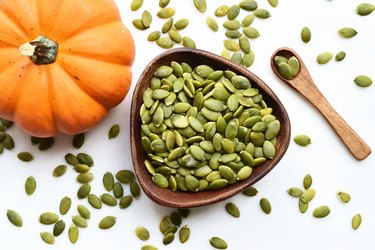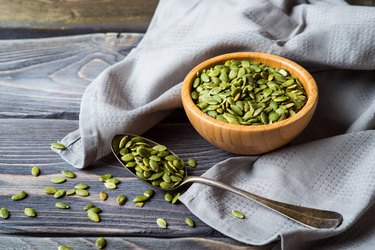
Pumpkin seeds are nutrient-dense and delicious. But they can also cause allergic reactions in some people, unfortunately. While pumpkin seed allergies are not as common as other seed allergies, such as sesame, reactions can range from mild to life-threatening.
If you think you have an allergy to pumpkin seeds, read on to learn about causes, symptoms, related allergies and treatment options.
Video of the Day
Video of the Day
Pumpkin Seed Allergy Symptoms
Allergies to pumpkin seeds often affect the skin. But people who are allergic to pumpkin seeds can also have trouble breathing and even experience a life-threatening reaction known as anaphylaxis shock.
You may even feel like you've gotten pumpkin seed poisoning, but this is just the effect of a severe allergic reaction.
According to Seattle Children's Hospital, food allergies typically cause symptoms like:
- An itchy rash or hives
- Swelling of the lips, tongue or throat
- Wheezing or coughing
- Difficulty breathing or shortness of breath
- Diarrhea or vomiting
- Anaphylaxis
Case studies of people with pumpkin seed allergies also report oral allergy symptoms, including an itchy throat and mouth.
Warning
If you're having a severe allergic reaction to pumpkin seeds, including swelling of the lips, mouth or tongue, difficulty breathing, slurred speech or irregular heartbeat, call 911 or seek immediate medical attention.
Causes
If you're allergic to pumpkin seeds, your symptoms are caused by eating (or in some cases, simply coming in close contact with) the seeds. Look out for raw or roasted pumpkin seeds in salads, soups, stir fry dishes, baked goods and more.
Pumpkin seeds are also sometimes ground up and used to create fishing bait. Case studies report instances of people who fish and are regularly exposed to bait derived from pumpkin seeds developing pumpkin seed allergies, according to a 2017 review in the European Annals of Allergy and Clinical Immunology.
Sensitivity to other seeds or related foods can also increase your risk of pumpkin seed allergies.
Even if you're not allergic, pumpkin seeds may give you a stomachache if you eat too many of them in one sitting. These little seeds are packed with fiber, which can sometimes lead to gas and bloating, especially if you eat a lot. Getting too much fiber at once can sometimes cause your stomach to cramp and feel distended or even painful, according to the Mayo Clinic.
If you have an allergy to pumpkin seeds, you could also be at a higher risk of an allergy to other related foods. Cross-reactivity can cause reactions in related seeds, pulps and plants.
Here are some foods you could potentially also be allergic to, specifically members of the Rosacea family, per a June 2016 review article in the European Journal of Allergy and Clinical Immunology:
- Apples
- Apricots
- Pears
- Peaches
- Cherries
Can you be allergic to pumpkin seeds and not pumpkin? It's possible, yes. Although it's rare, you do have the potential for an allergy to pumpkin pulp if you have a pumpkin seed allergy. In this case, you could also react to other members of the Cucurbitaceae family, including:
- Cantaloupe
- Watermelon
- Cucumber
- Zucchini
Maybe you're curious whether a pumpkin seed allergy constitutes a nut allergy. And if you're concerned about tree nut allergies, you may be wondering if you can eat pumpkin seeds or pumpkin seed shells. Because they're seeds, pumpkin seeds are not classified as tree nuts. People who are allergic to tree nuts usually need to avoid foods like almonds, walnuts, cashews, pine nuts and Brazil nuts.
What About Pumpkin Seed Oil?
Pumpkin seed oil is often used for cooking and in supplements. If you are allergic or sensitive to pumpkin seeds, it's possible to have side effects in response to pumpkin seed oil. Be sure to check ingredients (both on products and with restaurant servers) if you are concerned.
Pumpkin Seed Allergy Treatment
Once an allergist confirms you have a pumpkin seed allergy, the best way to avoid symptoms is by avoiding the seeds and anything made with them.
As pumpkin seeds are often used as garnishes, it's important to relay this information to restaurant servers and carefully read ingredient lists on packaged foods.
If your symptoms are mild and include a rash, itching or mild swelling, an over-the-counter antihistamine such as Benadryl ($6.49, Amazon) can help counteract the allergic reaction.
If you experience a severe reaction from eating pumpkin seeds, seek emergency help, as this could require an epinephrine injection. Talk to your doctor about carrying an epinephrine auto-injector (EpiPen) if you've had a life-threatening reaction to pumpkin seeds in the past.
- U.S. National Library of Medicine: "Food Allergy to Pumpkin Seeds--Characterization of Allergens"
- European Journal of Allergy and Clinical Immunology: "Hypersensitivities to sesame and other common edible seeds"
- Mayo Clinic: "Dietary fiber: Essential for a healthy diet:
- Seattle Children's Hospital: "Food Allergy"
- Pediatric Allergy, Immunology and Pulmonology: "Recurrent Anaphylaxis with Watermelon and Pumpkin Seeds in a Boy Tolerant to Their Pulps"
- European Annals of Allergy and Clinical Immunology: "Medicinal bioactivites and allergenic properties of pumpkin seeds: review upon a pediatric food anaphylaxis case report"


